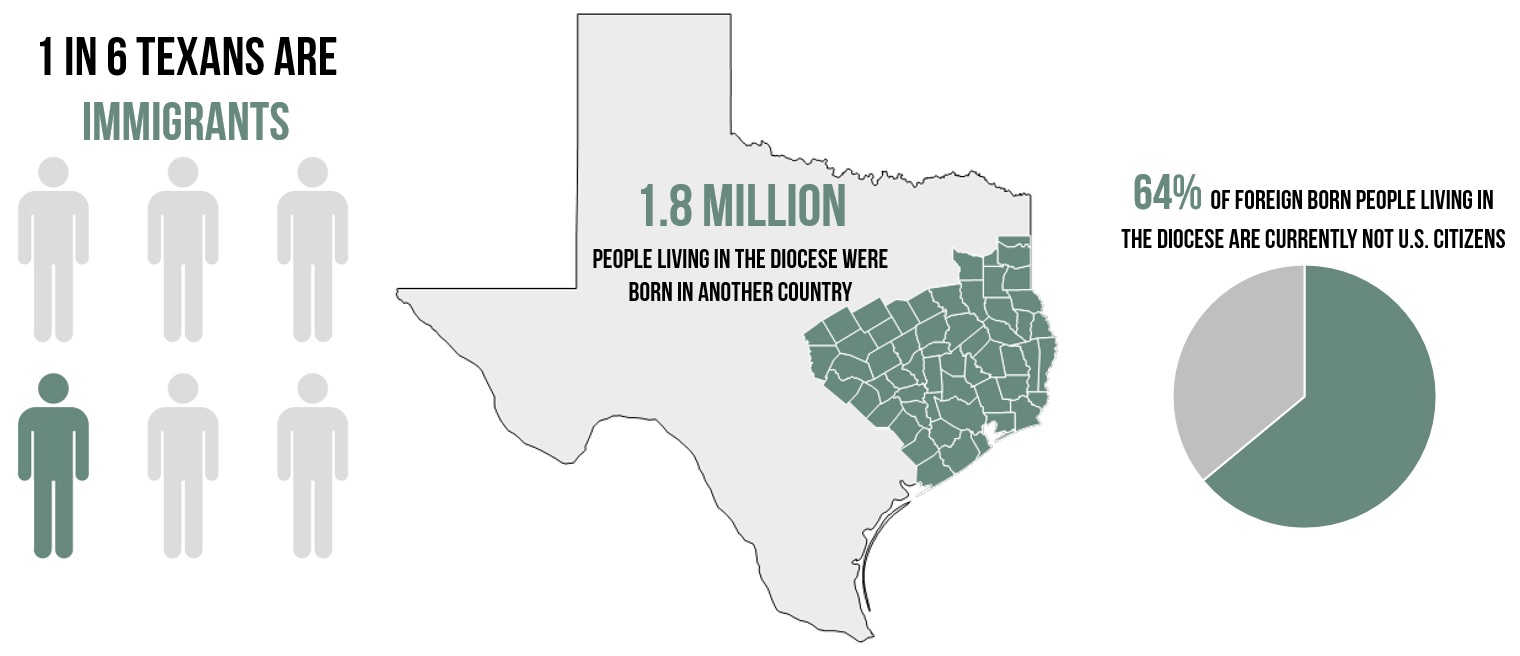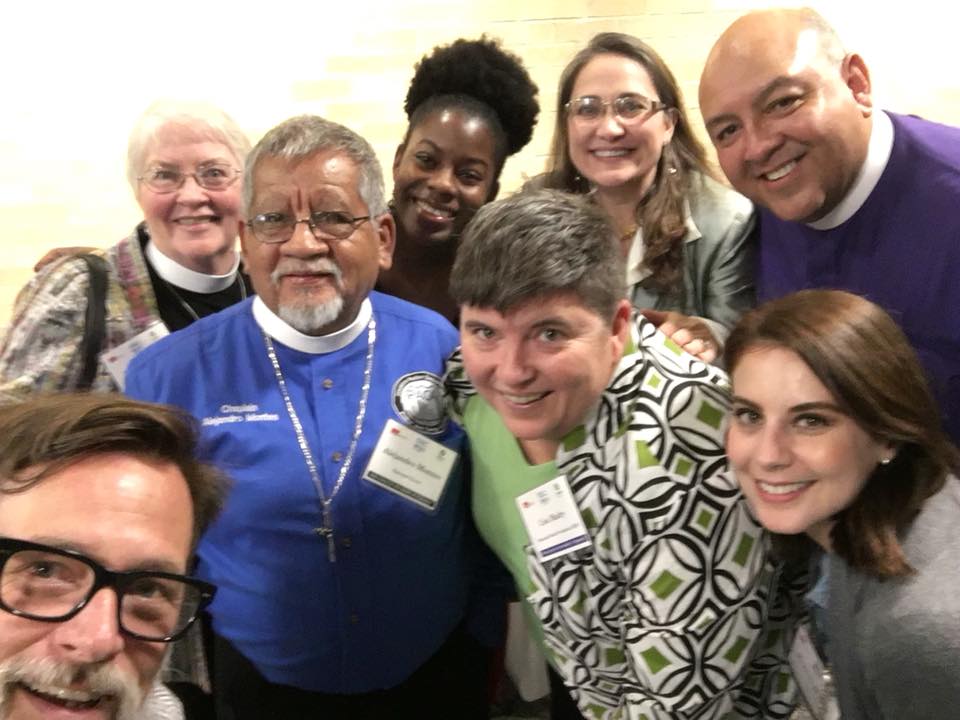
The Episcopal Church has a long history of advocacy for immigrants and refugees. As early as the late 1880s, the church opened chaplaincies in port cities across the country to welcome newly-arrived immigrants. Since 1982, our General Convention and Ecumenical Councils have adopted at least 53 statements related to immigrant and refugee issues and rights. These statements range from positions supporting the Sanctuary Movement, deploring inhumane and high levels of detention and deportation, to calling for “a robust, holistic, regional humanitarian response from the US government and its allies that address the root causes of violence in the region” of the Americas.
For some time, EHF has recognized that immigration issues comprise a cluster of outreach mission work among congregations in the diocese, overlapping with issues of poverty, race, and civic engagement/organizing. On October 11-12, EHF partnered with University of Texas Medical Branch in Galveston, Oxfam America, the World Health Organization and the Pan American Health Organization for a special conference examining the health barriers that migrants face in Texas.
The conference began with a comprehensive global view of the forces driving migration, and discussed the relationship to immigrant health and how individual families are affected. Examples of local issues ranged from abhorrent detention conditions, the separation of families, the public safety interest in creating a safe environment for all immigrants, and the importance of access to care to protect the health of the broader public.
The role of The Episcopal Church, including many of our congregations in the diocese, as well as the broader faith community, drew significant interest from the audience in crafting a path forward. The conference culminated in a call to action to develop policies, public action, and outreach practices to better support inclusion and well-being of our immigrant community, recognizing that their interests are a critical part of building healthy communities for all.
Anyone who lives in Texas knows that our state is home to a significant immigrant population, including refugees as well as documented and undocumented immigrants. One in six Texans is an immigrant. Out of a total population of about 10.7 million people in the 57 counties included in the Episcopal Diocese of Texas, estimates from the United States Census Bureau show that there are approximately 1.8 million foreign born individuals living in the region — 17% of the total population. Almost two-thirds of those foreign born individuals are not U.S. citizens, which includes both documented and undocumented immigrants. If we care about the health of our communities, we need to understand the special challenges our immigrant communities face accessing healthcare and making ends meet in our current economic climate.
Speakers at the conference addressed the challenges immigrant communities face on many fronts. For those here legally, they still often have difficulty accessing culturally competent care and navigating a complex healthcare system. For those here without legal status, many are fleeing very difficult situations and have suffered violence, abuse or extreme poverty. They need access to physical and mental health services that are culturally relevant and equipped to address their needs.
Several recent policy changes at the state and federal level have added to the fear immigrants face. The passage of Senate Bill 4 at the state legislature earlier this year requires local law enforcement officers to honor federal immigration detention orders for anyone in custody. This gives individual police officers great discretion, and some fear it may lead to local law enforcement officers targeting individuals they suspect may be undocumented. Clinics are reporting declining visits as patients stay home. (See Bishop Andy Doyle’s statement opposing SB4)
Another recent policy decision at the federal level will remove temporary protection for individuals who arrived here as children. The Deferred Action for Childhood Arrivals (DACA) program allowed 800,000 individuals who came to the US as children and grew up here to have a legal status allowing them to work and live without fear of immediate deportation. The White House has announced it plans to phase out this policy, leaving those individuals who registered with DACA fearful they have now exposed their status and may end up being deported to a country where they have never lived.
These policies are affecting people every day in our diocese. When immigrants are isolated in detention, we are unhealthier as a society and as individuals. When people are afraid to go to community health centers because they are fearful of being picked up by immigration officers, the clinics cannot provide critical services, trust is lost, and disease spreads and embeds underground. Isolation creeps in, and exploitation and new forms of abuse emerge. The community itself becomes more fractured and weak. But when immigrants are treated with respect and dignity, we move to reconciliation and health.

How Are Episcopal Churches Responding?
Episcopal churches were well represented at the conference. Policy makers, community leaders and healthcare practitioners welcomed voices from the faith community willing to engage at a deep level to understand the challenges and help respond to some of the pressures created by the current policy environment. Deacon Mary Lenn Dixon from Bryan College station moderated a panel on the role of civic engagement and community action. The Revs. Hannah Atkins (Trinity Houston) and Ed Gomez (St. Paul’s/San Pablo Houston) offered suggestions for local action. Bishop Hector Monteroso hosted the reception and offered perspectives from his experiences serving in Central America where many of our immigrants come from.
For years, Episcopal churches in the Diocese of Texas have hosted refugee families arriving in the United States through Episcopal Migration Ministries. Now that the state program is slowing down due to cutbacks in the number of refugees entering the U.S., many of these congregations will shift their work to advocating for increasing the refugee quotas and improving immigrant and refugee policies. A number of other Episcopal churches in the Diocese of Texas such as Projecto Santiago at St. James’ Austin and San Pedro/St.Peter’s Pasadena have also been responding by holding “Know Your Rights” seminars to help people understand exactly what is required and not required in the event they interact with law officials.